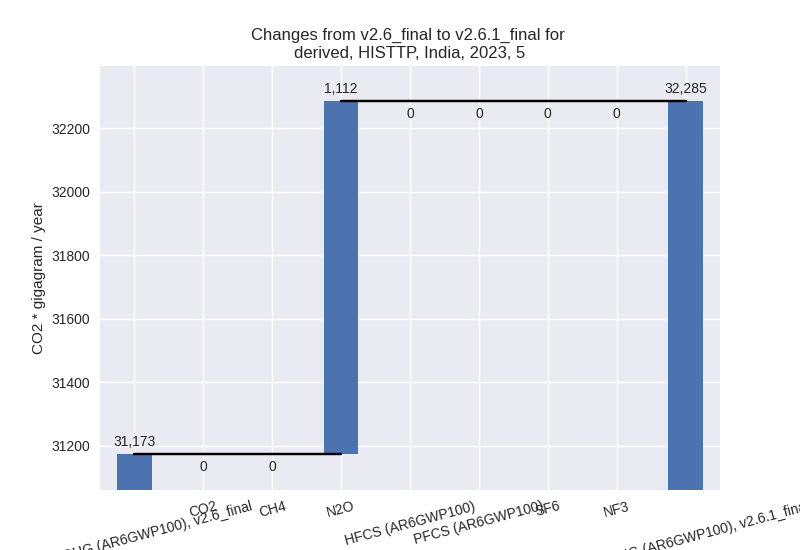Changes in PRIMAP-hist v2.6.1_final compared to v2.6_final for India
2025-03-19
Johannes Gütschow
Change analysis for India for PRIMAP-hist v2.6.1_final compared to v2.6_final
Overview over emissions by sector and gas
The following figures show the aggregate national total emissions excluding LULUCF AR6GWP100 for the country reported priority scenario. The dotted linesshow the v2.6_final data.
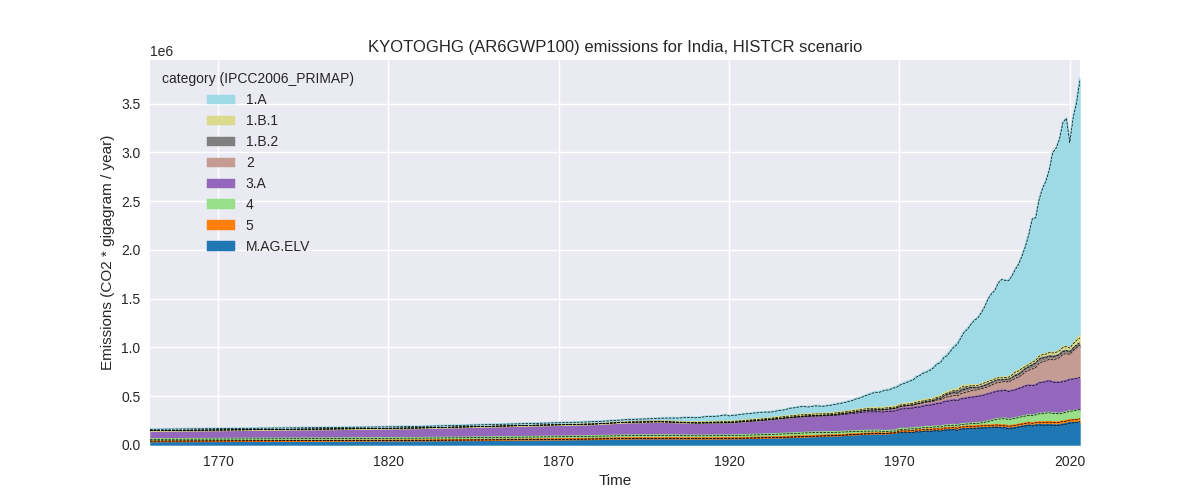
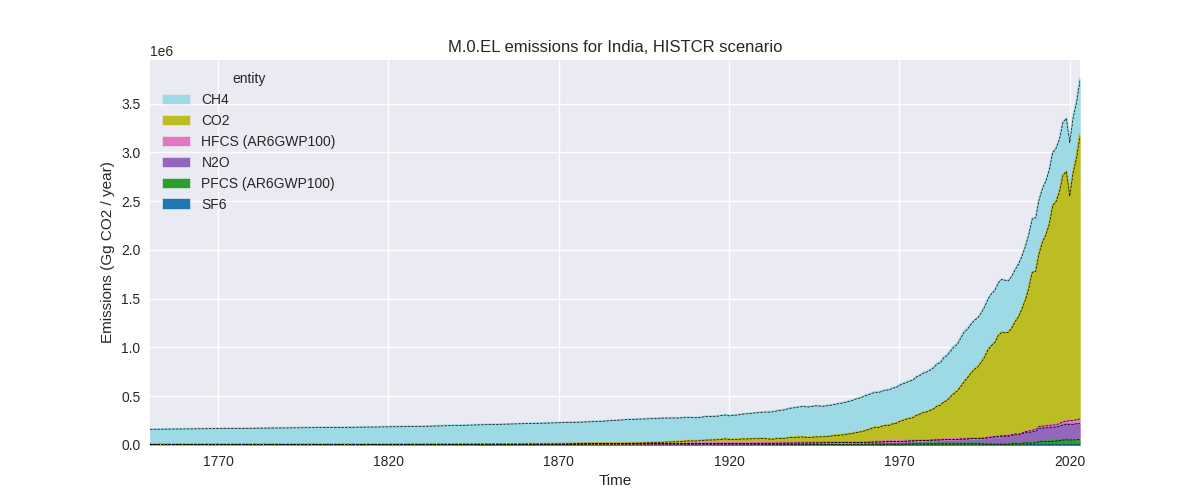
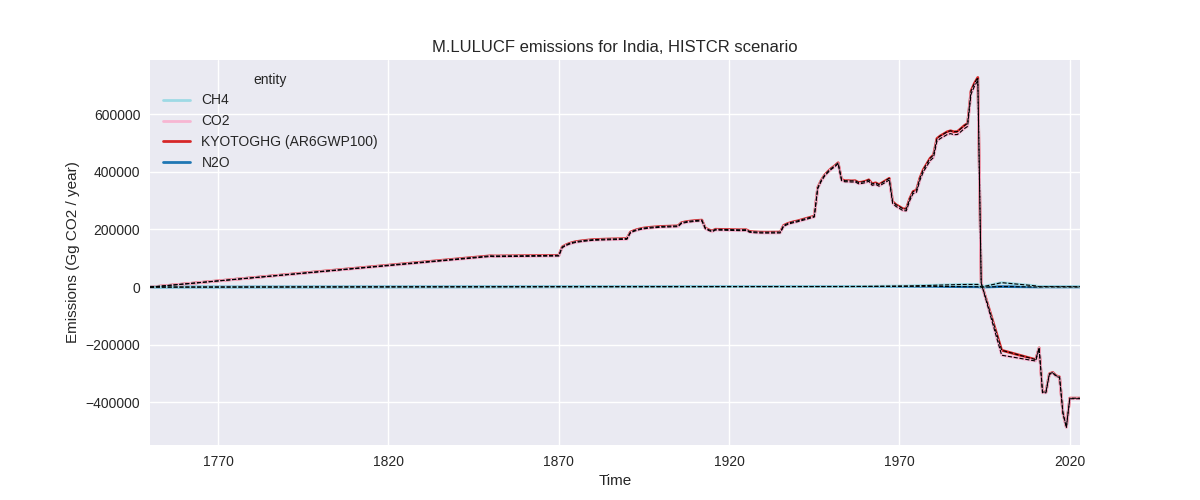
The following figures show the aggregate national total emissions excluding LULUCF AR6GWP100 for the third party priority scenario. The dotted linesshow the v2.6_final data.
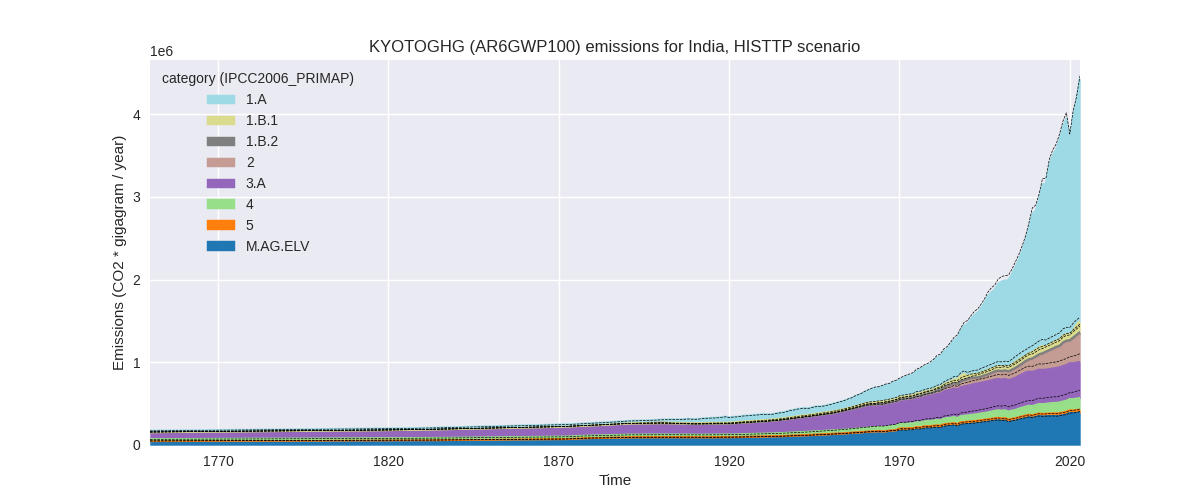
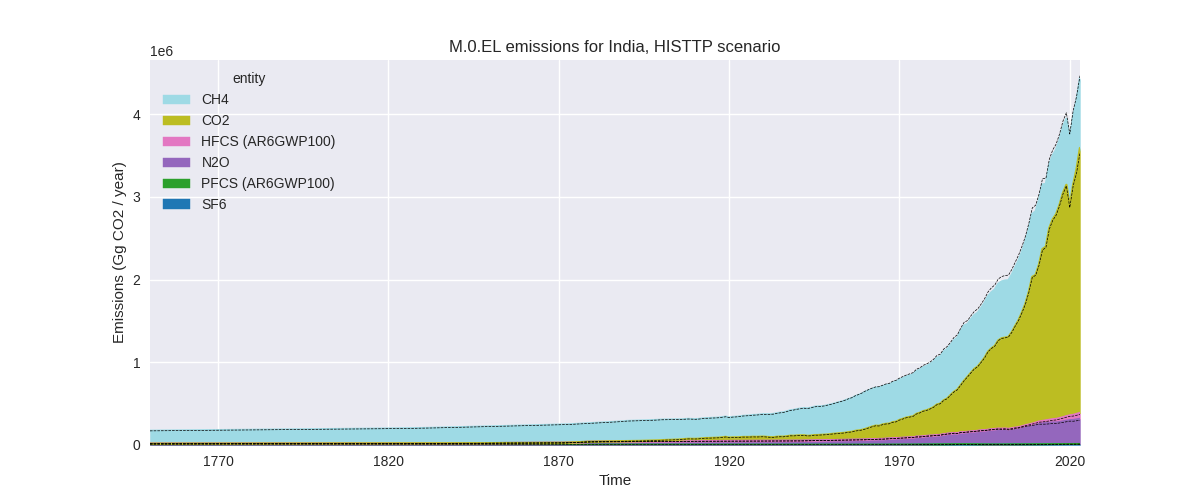
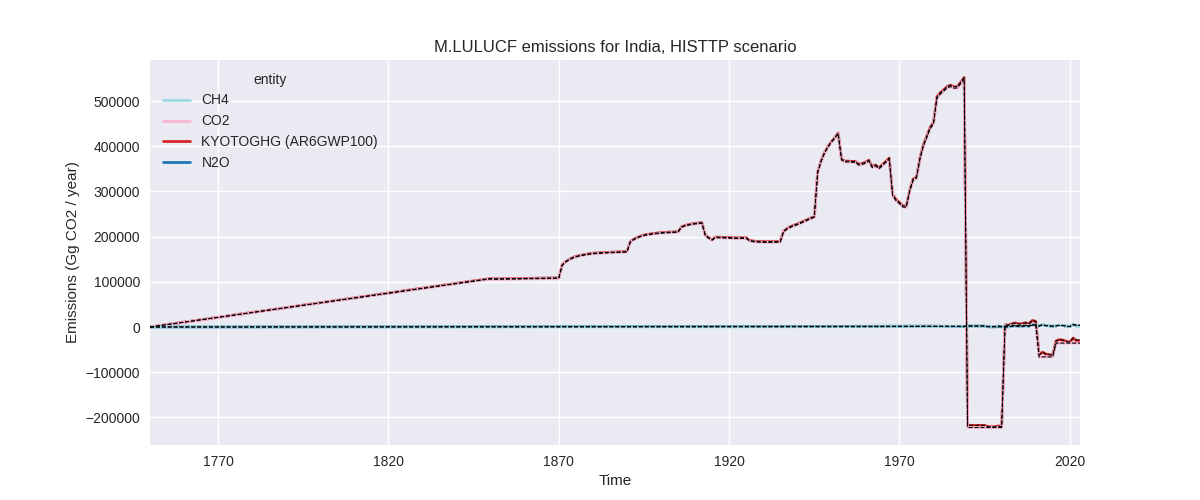
Overview over changes
In the country reported priority scenario we have the following changes for aggregate Kyoto GHG and national total emissions excluding LULUCF (M.0.EL):
- Emissions in 2023 have changed by 0.6%% (22646.60 Gg CO2 / year)
- Emissions in 1990-2023 have changed by 0.1%% (1476.31 Gg CO2 / year)
In the third party priority scenario we have the following changes for aggregate Kyoto GHG and national total emissions excluding LULUCF (M.0.EL):
- Emissions in 2023 have changed by -0.7%% (-31562.60 Gg CO2 / year)
- Emissions in 1990-2023 have changed by -2.3%% (-62883.19 Gg CO2 / year)
Most important changes per scenario and time frame
In the country reported priority scenario the following sector-gas combinations have the highest absolute impact on national total KyotoGHG (AR6GWP100) emissions in 2023 (top 5):
- 1: 1.B.1, CO2 with 33264.63 Gg CO2 / year (211.8%)
- 2: 2, PFCS (AR6GWP100) with -11341.41 Gg CO2 / year (-20.6%)
- 3: 1.A, N2O with 4639.07 Gg CO2 / year (21.8%)
- 4: M.AG.ELV, CH4 with -4585.94 Gg CO2 / year (-3.9%)
- 5: 2, CO2 with 4275.04 Gg CO2 / year (1.9%)
In the country reported priority scenario the following sector-gas combinations have the highest absolute impact on national total KyotoGHG (AR6GWP100) emissions in 1990-2023 (top 5):
- 1: 1.B.1, CO2 with 1757.85 Gg CO2 / year (18.0%)
- 2: 1.B.2, CH4 with 939.43 Gg CO2 / year (3.6%)
- 3: 2, PFCS (AR6GWP100) with -825.70 Gg CO2 / year (-3.4%)
- 4: M.AG.ELV, CO2 with -279.19 Gg CO2 / year (-1.3%)
- 5: 2, CO2 with 192.13 Gg CO2 / year (0.2%)
In the third party priority scenario the following sector-gas combinations have the highest absolute impact on national total KyotoGHG (AR6GWP100) emissions in 2023 (top 5):
- 1: 4, CH4 with -85670.07 Gg CO2 / year (-40.8%)
- 2: 1.B.1, CO2 with 33264.63 Gg CO2 / year (211.8%)
- 3: 1.A, N2O with 19161.83 Gg CO2 / year (73.0%)
- 4: 1.B.1, CH4 with 12370.19 Gg CO2 / year (18.3%)
- 5: 2, CO2 with 10302.81 Gg CO2 / year (4.2%)
In the third party priority scenario the following sector-gas combinations have the highest absolute impact on national total KyotoGHG (AR6GWP100) emissions in 1990-2023 (top 5):
- 1: 4, CH4 with -65264.74 Gg CO2 / year (-40.9%)
- 2: 1.B.2, CH4 with -7312.36 Gg CO2 / year (-38.5%)
- 3: 1.A, N2O with 5712.77 Gg CO2 / year (30.8%)
- 4: 1.B.1, CH4 with 2540.61 Gg CO2 / year (5.0%)
- 5: 1.B.1, CO2 with 1757.85 Gg CO2 / year (18.0%)
Notes on data changes
Here we list notes explaining important emissions changes for the country.
- No new country reported data has been included. Changes in the CR time-series are small and come from updated third party data (EDGAR, FAO) which is used to extrapolate the country reported data. For CO2 in 1.B.1 and CH4 in 1.B.2 no country reported data exists and thus the change in EDGAR data affects the full time series.
- Changes in the TP scenario are a bit higher because of new EDGAR data waste CH4.
Changes by sector and gas
For each scenario and time frame the changes are displayed for all individual sectors and all individual gases. In the sector plot we use aggregate Kyoto GHGs in AR6GWP100. In the gas plot we usenational total emissions without LULUCF.
country reported scenario
2023
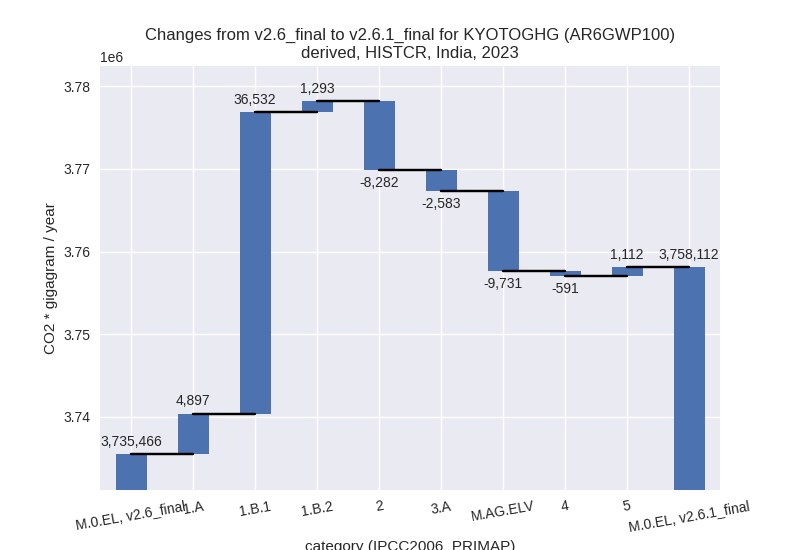
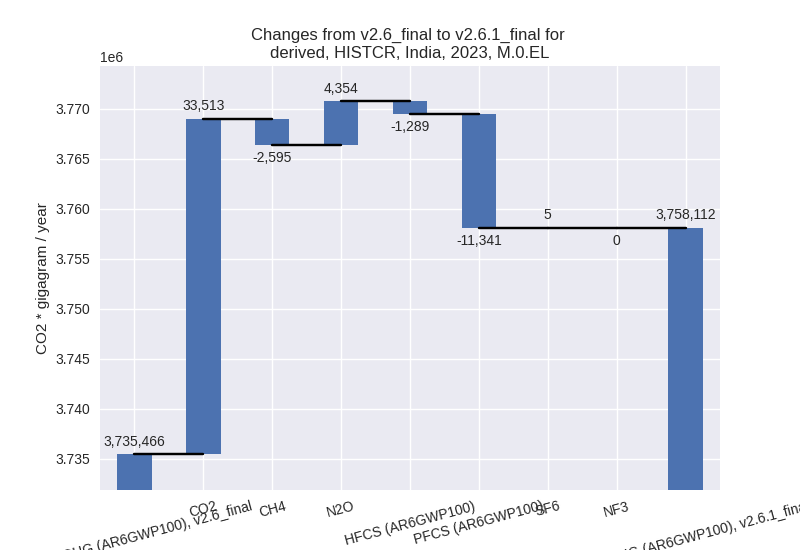
1990-2023
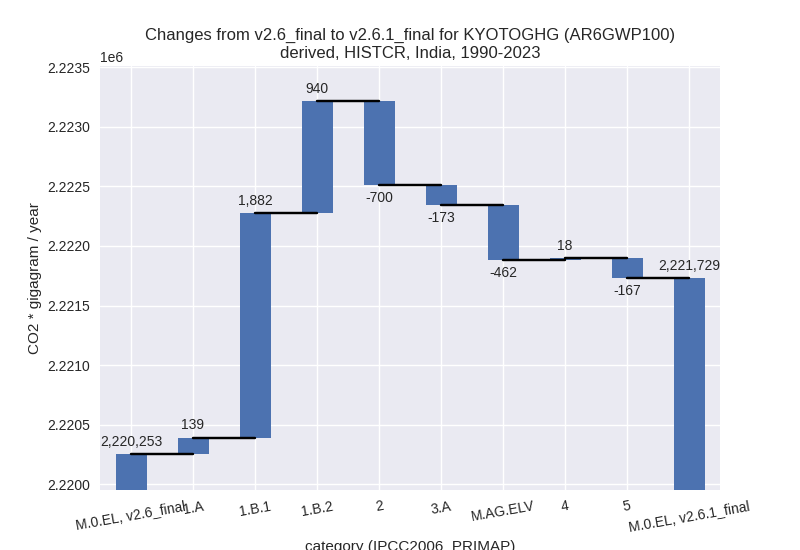
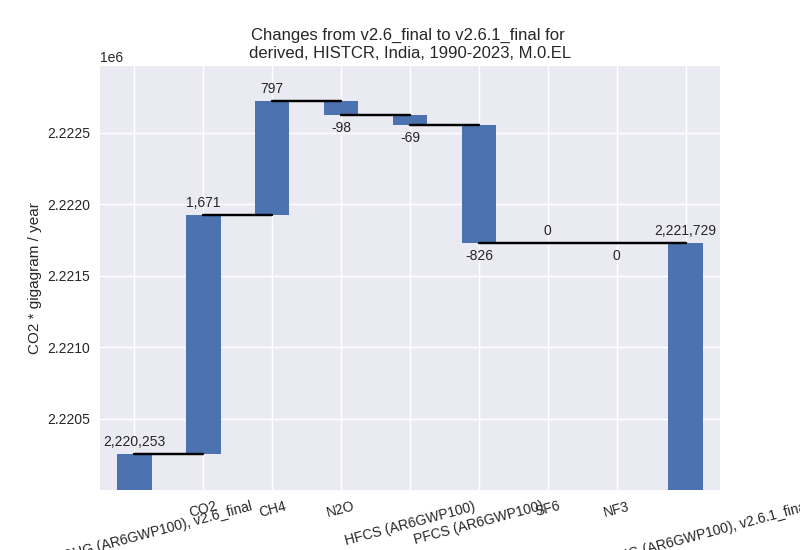
third party scenario
2023
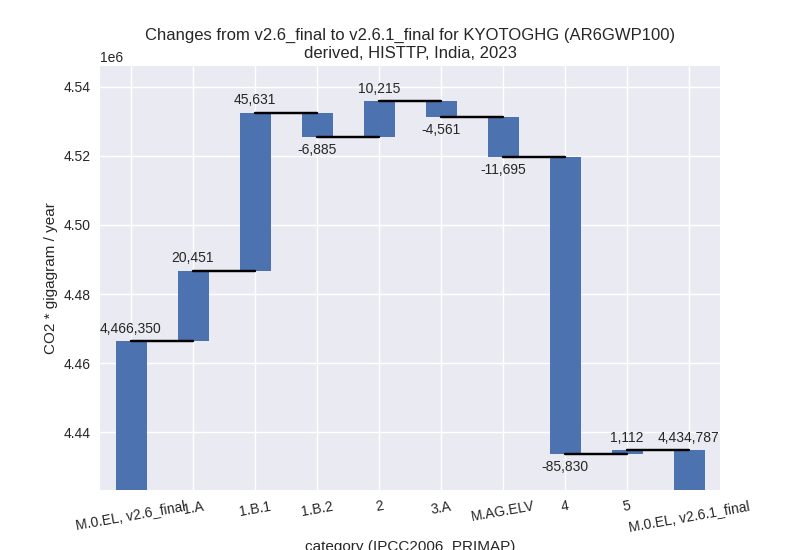
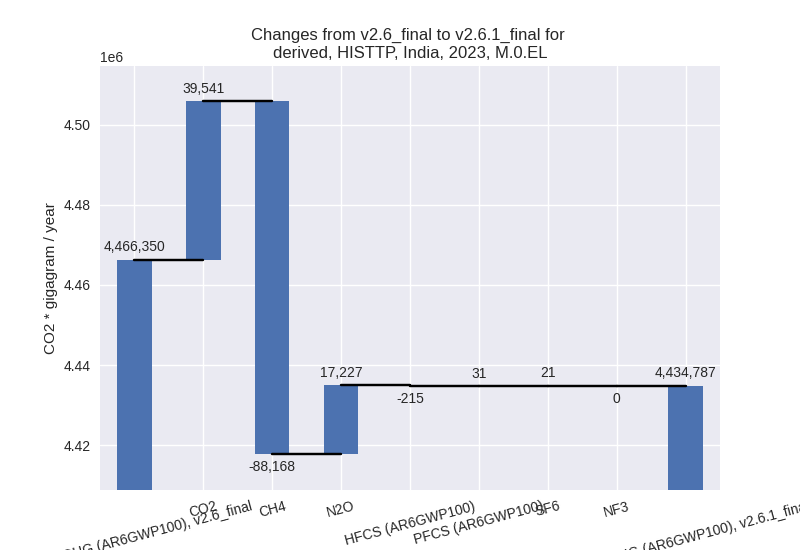
1990-2023
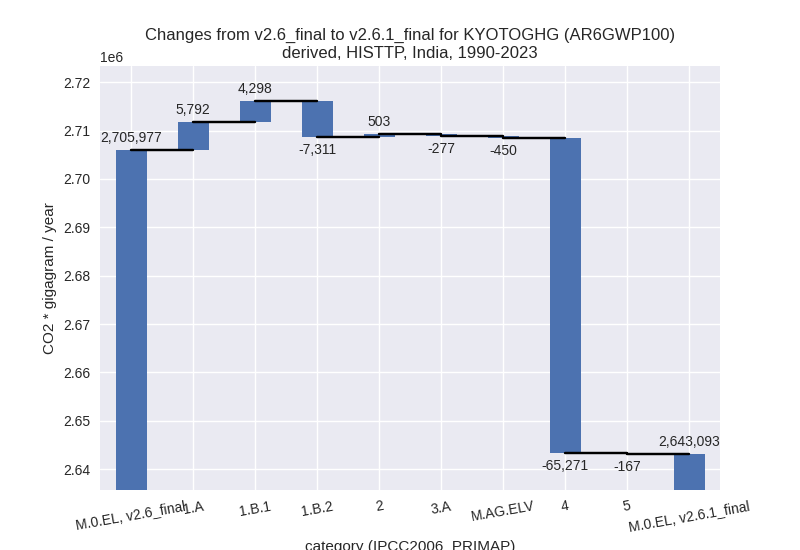
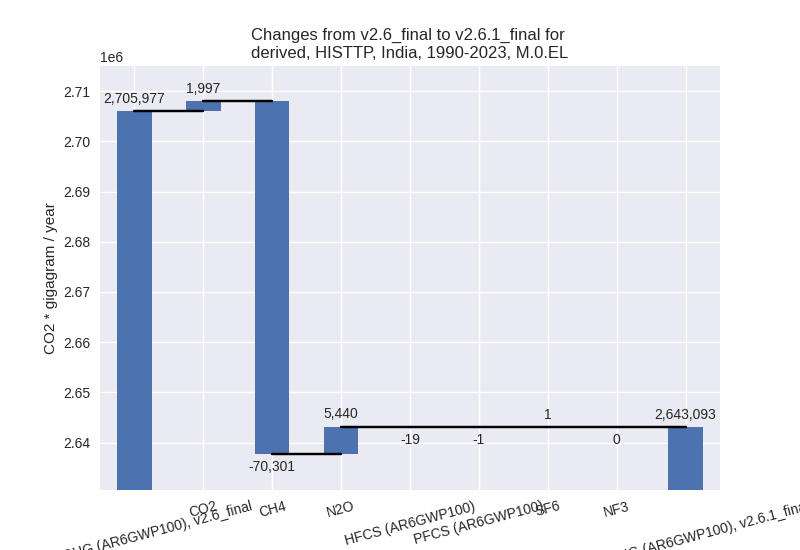
Detailed changes for the scenarios:
country reported scenario (HISTCR):
Most important changes per time frame
For 2023 the following sector-gas combinations have the highest absolute impact on national total KyotoGHG (AR6GWP100) emissions in 2023 (top 5):
- 1: 1.B.1, CO2 with 33264.63 Gg CO2 / year (211.8%)
- 2: 2, PFCS (AR6GWP100) with -11341.41 Gg CO2 / year (-20.6%)
- 3: 1.A, N2O with 4639.07 Gg CO2 / year (21.8%)
- 4: M.AG.ELV, CH4 with -4585.94 Gg CO2 / year (-3.9%)
- 5: 2, CO2 with 4275.04 Gg CO2 / year (1.9%)
For 1990-2023 the following sector-gas combinations have the highest absolute impact on national total KyotoGHG (AR6GWP100) emissions in 1990-2023 (top 5):
- 1: 1.B.1, CO2 with 1757.85 Gg CO2 / year (18.0%)
- 2: 1.B.2, CH4 with 939.43 Gg CO2 / year (3.6%)
- 3: 2, PFCS (AR6GWP100) with -825.70 Gg CO2 / year (-3.4%)
- 4: M.AG.ELV, CO2 with -279.19 Gg CO2 / year (-1.3%)
- 5: 2, CO2 with 192.13 Gg CO2 / year (0.2%)
Changes in the main sectors for aggregate KyotoGHG (AR6GWP100) are
- 1: Total sectoral emissions in 2022 are 2539842.30 Gg CO2 / year which is 72.1% of M.0.EL emissions. 2023 Emissions have changed by 1.6% (42721.40 Gg CO2 / year). 1990-2023 Emissions have changed by 0.2% (2960.98 Gg CO2 / year).
- 2: Total sectoral emissions in 2022 are 307871.59
Gg CO2 / year which is 8.7% of M.0.EL emissions. 2023 Emissions have
changed by -2.5% (-8282.27 Gg CO2 /
year). 1990-2023 Emissions have changed by -0.4% (-699.94 Gg CO2 / year). For 2023
the changes per gas
are:
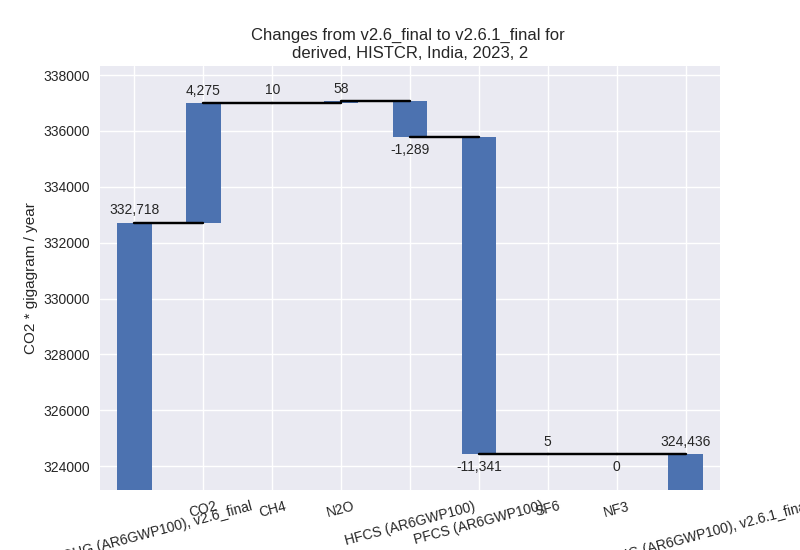
- M.AG: Total sectoral emissions in 2022 are
551667.45 Gg CO2 / year which is 15.7% of M.0.EL emissions. 2023
Emissions have changed by -2.2%
(-12313.28 Gg CO2 / year). 1990-2023 Emissions have changed by -0.1% (-635.57 Gg CO2 / year). For 2023
the changes per gas
are:
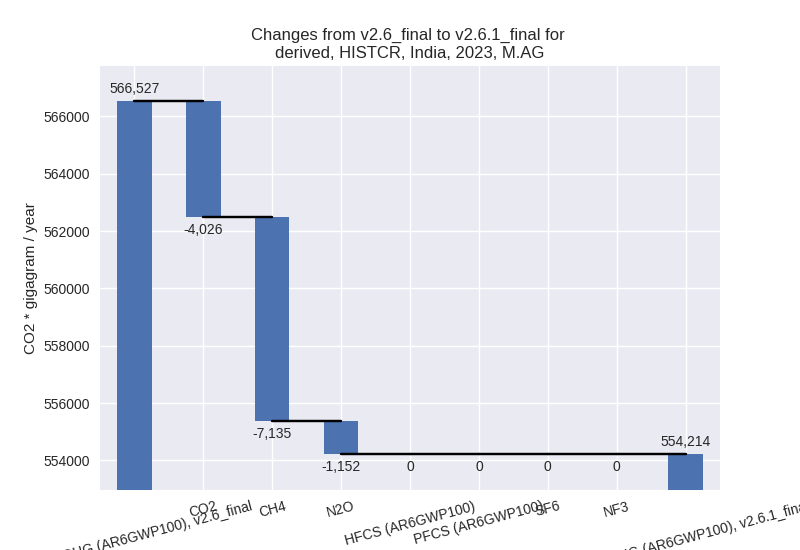
The changes come from the following subsectors:- 3.A: Total sectoral emissions in 2022 are 325555.35 Gg CO2 / year which is 59.0% of category M.AG emissions. 2023 Emissions have changed by -0.8% (-2582.77 Gg CO2 / year). 1990-2023 Emissions have changed by -0.1% (-173.16 Gg CO2 / year).
- M.AG.ELV: Total sectoral emissions in 2022 are
226112.10 Gg CO2 / year which is 41.0% of category M.AG emissions. 2023
Emissions have changed by -4.1%
(-9730.51 Gg CO2 / year). 1990-2023 Emissions have changed by -0.2% (-462.41 Gg CO2 / year). For 2023
the changes per gas
are:
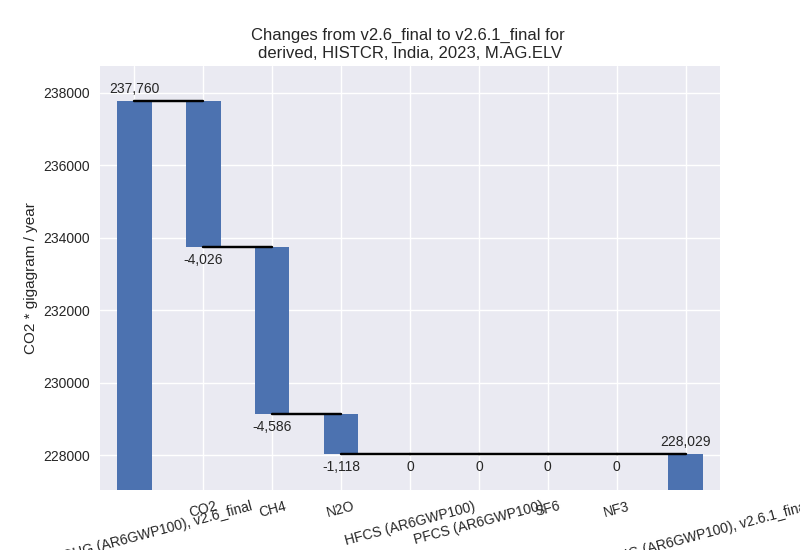
There is no subsector information available in PRIMAP-hist.
- 4: Total sectoral emissions in 2022 are 92771.29 Gg CO2 / year which is 2.6% of M.0.EL emissions. 2023 Emissions have changed by -0.6% (-591.06 Gg CO2 / year). 1990-2023 Emissions have changed by 0.0% (17.70 Gg CO2 / year).
- 5: Total sectoral emissions in 2022 are 31563.11 Gg
CO2 / year which is 0.9% of M.0.EL emissions. 2023 Emissions have
changed by 3.6% (1111.73 Gg CO2 /
year). 1990-2023 Emissions have changed by -0.6% (-166.85 Gg CO2 / year). For 2023
the changes per gas
are:
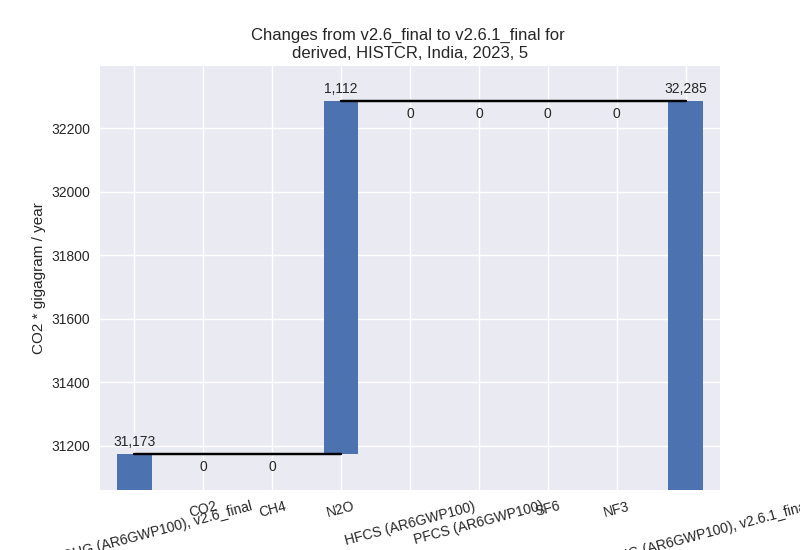
third party scenario (HISTTP):
Most important changes per time frame
For 2023 the following sector-gas combinations have the highest absolute impact on national total KyotoGHG (AR6GWP100) emissions in 2023 (top 5):
- 1: 4, CH4 with -85670.07 Gg CO2 / year (-40.8%)
- 2: 1.B.1, CO2 with 33264.63 Gg CO2 / year (211.8%)
- 3: 1.A, N2O with 19161.83 Gg CO2 / year (73.0%)
- 4: 1.B.1, CH4 with 12370.19 Gg CO2 / year (18.3%)
- 5: 2, CO2 with 10302.81 Gg CO2 / year (4.2%)
For 1990-2023 the following sector-gas combinations have the highest absolute impact on national total KyotoGHG (AR6GWP100) emissions in 1990-2023 (top 5):
- 1: 4, CH4 with -65264.74 Gg CO2 / year (-40.9%)
- 2: 1.B.2, CH4 with -7312.36 Gg CO2 / year (-38.5%)
- 3: 1.A, N2O with 5712.77 Gg CO2 / year (30.8%)
- 4: 1.B.1, CH4 with 2540.61 Gg CO2 / year (5.0%)
- 5: 1.B.1, CO2 with 1757.85 Gg CO2 / year (18.0%)
Changes in the main sectors for aggregate KyotoGHG (AR6GWP100) are
- 1: Total sectoral emissions in 2022 are 2850036.70 Gg CO2 / year which is 68.4% of M.0.EL emissions. 2023 Emissions have changed by 2.0% (59197.30 Gg CO2 / year). 1990-2023 Emissions have changed by 0.2% (2778.50 Gg CO2 / year).
- 2: Total sectoral emissions in 2022 are 322648.51
Gg CO2 / year which is 7.7% of M.0.EL emissions. 2023 Emissions have
changed by 3.1% (10214.87 Gg CO2 /
year). 1990-2023 Emissions have changed by 0.3% (502.71 Gg CO2 / year). For 2023 the
changes per gas
are:
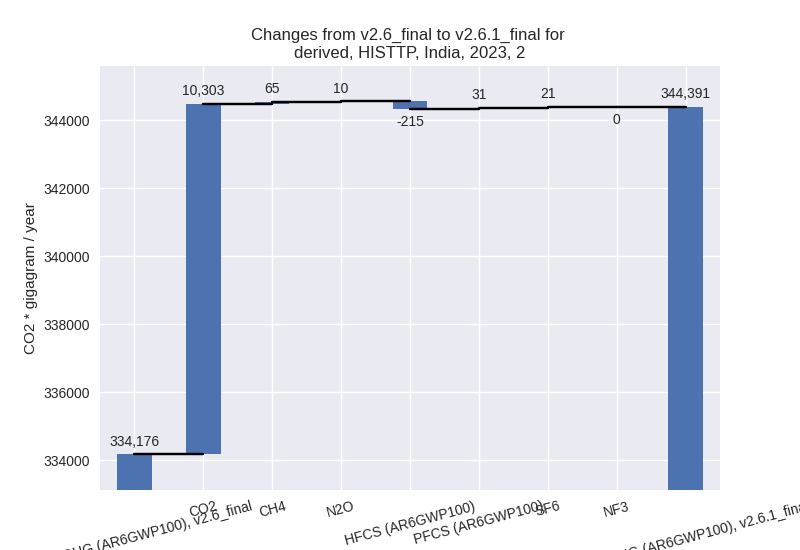
- M.AG: Total sectoral emissions in 2022 are 824125.75 Gg CO2 / year which is 19.8% of M.0.EL emissions. 2023 Emissions have changed by -1.9% (-16256.51 Gg CO2 / year). 1990-2023 Emissions have changed by -0.1% (-727.04 Gg CO2 / year).
- 4: Total sectoral emissions in 2022 are 138788.97
Gg CO2 / year which is 3.3% of M.0.EL emissions. 2023 Emissions have
changed by -37.7% (-85830.02 Gg CO2
/ year). 1990-2023 Emissions have changed by -37.9% (-65270.50 Gg CO2 / year). For 2023
the changes per gas
are:
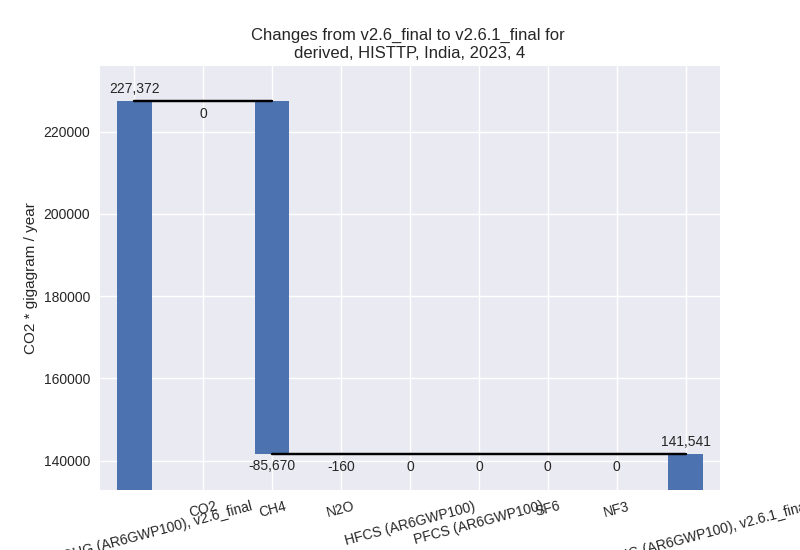
For 1990-2023 the changes per gas are: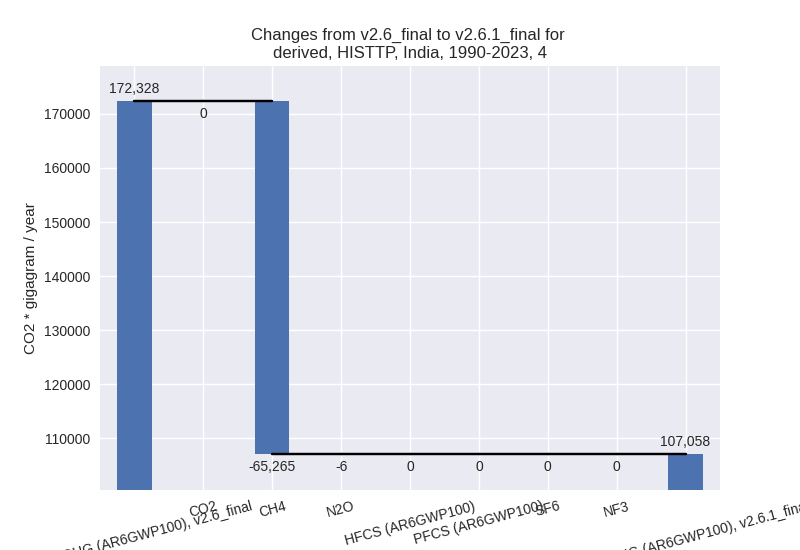
- 5: Total sectoral emissions in 2022 are 31563.11 Gg
CO2 / year which is 0.8% of M.0.EL emissions. 2023 Emissions have
changed by 3.6% (1111.73 Gg CO2 /
year). 1990-2023 Emissions have changed by -0.6% (-166.85 Gg CO2 / year). For 2023
the changes per gas
are:
